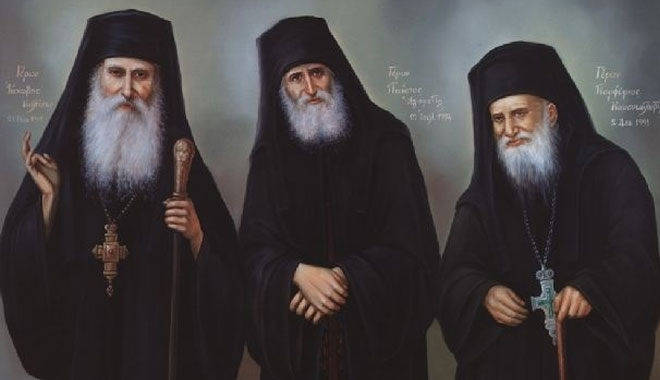Repentance, as I learned it from contemporary Saints and Elders
13 April 2021I was fortunate enough to know personally quite a few of the contemporary Saints and Elders at the time when I was exploring the way of the spiritual life.
What, in practice, is the path to being cured of our sins and passions, so that we ask for love for God and our neighbour?
I’d heard and read that, in order to love God with all our heart, we have to pass through the stages of purification, enlightenment and deification, as these are taught by the Gospels, the Fathers and the sacred Tradition of our Orthodox Church.
I read many Lives of the saints, but really needed to be taught by the contemporary holy fathers who were well-known at that time: Saint Porfyrios, Saint Païsios, the holy Elder Iakovos Tsalikis, Elder Amvrosios of the Monastery of Dadi in Amfikleia, Elder Iosif Vatopaidinos, Papa-Markos Manolis, the holy Elder Antonios Ghizas and so many others.
I’ll speak about each of them in turn, about the conversations I had with these Holy Fathers and what they told me, in simple and practical terms, about the sacrament of repentance.

The necessity arose from particular problems which took me, with the blessing of my spiritual guide, to Saint Porfyrios, in Milesi, in 1982, before the buildings were constructed as they are today. The meeting took place in a shack where the Saint was living and hearing confessions.
As soon as I saw him, I felt I was standing before God, I thought I was seeing him ‘with the fear of God, faith and love’.
‘Elder, I have a problem’, I told him.
‘I know’, he replied and told me what it was. (It had to do with my infancy and my family).
I’d married and just had a child. Through the relations within the home I realized that I would have to correct a serious problem in myself, which I also understood would be impossible to solve if I relied on my own powers, because it had started in my own infancy.
The Saint related the problem to me in detail, the time when it happened and how old I was then.
My feeling of weakness increased after the revelation and I asked:
‘What do I have to do to be healed?’.
‘Go to confession’, he told me.
‘But I confess. To my spiritual guide. Very often’, I answered.
‘What you’re doing isn’t enough’, he replied. ‘Confession isn’t just going to your spiritual guide and telling him your sins. Confession means that first of all you really repent, before you go. You’ve seen the Prodigal? First he recovered his senses, he became aware of his hunger and poverty, he felt that he’d lost the love of his father and wanted to return home, determined to live as one of the servants of his father. He arose and gladly and humbly returned, certain that his father would receive him with love.
The father forgave him, dressed him in fine clothes, gave him his ring and a fatted calf. In other words, he healed him. He forgave him and healed him.
This is what you do: When you get up in the morning, after you’ve said your prayers, either matins or your prayer-rope, tell Christ whatever sins you’ve committed before God and any hurt you’ve done to other people and ask for forgiveness.
‘How will I know I’ve been forgiven?’
‘Doesn’t Saint Paul say that the fruit of the Spirit is love, joy, peace and faith? If you feel these when you repent, you’ve received the first dose of forgiveness of sins and eternal life. In other words, you’ll be forgiven and you’ll feel the presence of God within you.
But we don’t stop there. So far we’ve said “Forgive us our debts”.
But Christ wants us also to say: “As we forgive our debtors”, doesn’t He?’.
‘Yes, He does’.
‘In fact, He says that unless we genuinely forgive those who’ve harmed us, He won’t forgive us. So first repent of your sins and, as soon as you’ve received forgiveness and feel the peace of the Holy Spirit, then you can, in turn, forgive others.
This is the “fatted calf”, the remission of sins and life everlasting, which the Prodigal received from his father- after he’d first repented- and which he later shared with his friends. That is to say, he gave them it with love, making them friends in his heart rather than the enemies they had been.
All this is in accordance with what Saint Symeon the New Theologian has to say on repentance. He writes:
“After your formal prayer, kneel and tell God your sins, and if Christ doesn’t remit your sins, may I lose my salvation!”.
So this is how you should confess. Repent in your morning prayers and be on guard the whole day long, so that you see if you’re transgressing Christ’s commandments: first in your desires, then in your words and finally in your actions. This is what Christ means when He says: “Watch and pray”.






